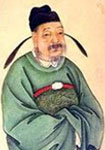《郑尚书新开涪江二首》贾岛 翻译、赏析和诗意
郑尚书新开涪江二首
岸凿青山破,江开白浪寒。
The green mountains crumbled as the river broke open with white, cold waves.
日沉源出海,春至草生滩。
The sun sets into the sea as spring arrives and grass grows on the shoal.
梓匠防波溢,蓬仙畏水干。
The craftsmen of Zizhou (a place known for its wood) guard against the overflowing waves, while the wandering immortals fear the drying of the water.
从今疏决后,任雨滞峰峦。
From now on, after the dig and separation, it allows rain to gather in the mountains.
不侵南亩务,已拔北江流。
It no longer encroaches upon the farmers in the south, and has already diverted the flow of the river in the north.
涪水方移岸,浔阳有到舟。
The Fu River shifts its banks, and Xunyang is accessible by boat.
潭澄初捣药,波动乍垂钩。
The clear pool is initially used for pounding medicine, while the rippling waves resemble dangling fishing hooks.
山可疏三里,从知历亿秋。
The mountains can be sparsely populated within three miles, and it is known to have endured countless autumns.
诗意和赏析:
这首诗是贾岛写给郑尚书的题词,歌颂了郑尚书治理涪江的成就和对当地人民的贡献。
诗的前两句描绘了开河的景象,以山崩裂和浪翻江潮为象征,生动地表现出江河畅通的景象。
接下来的两句描述了涪江的水流逆转,不再侵蚀南亩,转而改变北江的流向。这是郑尚书勤勉治理涪江的结果。
诗的后两句描述了涪江重新开辟的好处,潭澄之水清澈洁净,可以用来制药,同时波动的水面也像钓鱼的钩子,给人一种动感。
最后两句表达了对郑尚书成功治理涪江的赞美,山区可以疏通三里,持续经历了无数个秋天,显示了郑尚书治理涪江的艰辛和成就。
《郑尚书新开涪江二首》贾岛 拼音读音参考
zhèng shàng shū xīn kāi fú jiāng èr shǒu
郑尚书新开涪江二首
àn záo qīng shān pò, jiāng kāi bái làng hán.
岸凿青山破,江开白浪寒。
rì chén yuán chū hǎi, chūn zhì cǎo shēng tān.
日沉源出海,春至草生滩。
zǐ jiàng fáng bō yì, péng xiān wèi shuǐ gàn.
梓匠防波溢,蓬仙畏水干。
cóng jīn shū jué hòu, rèn yǔ zhì fēng luán.
从今疏决后,任雨滞峰峦。
bù qīn nán mǔ wù, yǐ bá běi jiāng liú.
不侵南亩务,已拔北江流。
fú shuǐ fāng yí àn, xún yáng yǒu dào zhōu.
涪水方移岸,浔阳有到舟。
tán chéng chū dǎo yào, bō dòng zhà chuí gōu.
潭澄初捣药,波动乍垂钩。
shān kě shū sān lǐ, cóng zhī lì yì qiū.
山可疏三里,从知历亿秋。
“已拔北江流”平仄韵脚
拼音:yǐ bá běi jiāng liú
平仄:仄平仄平平
韵脚:(平韵) 下平十一尤
